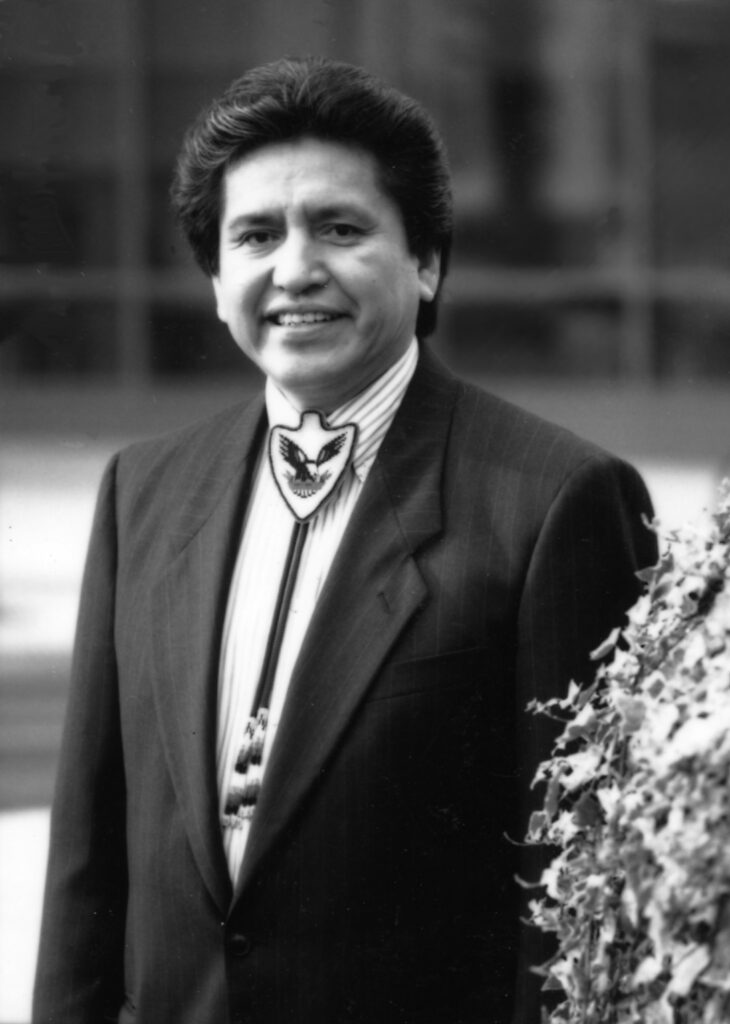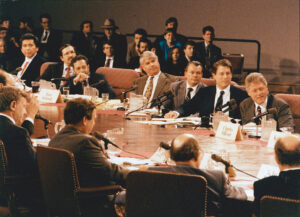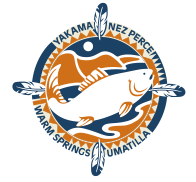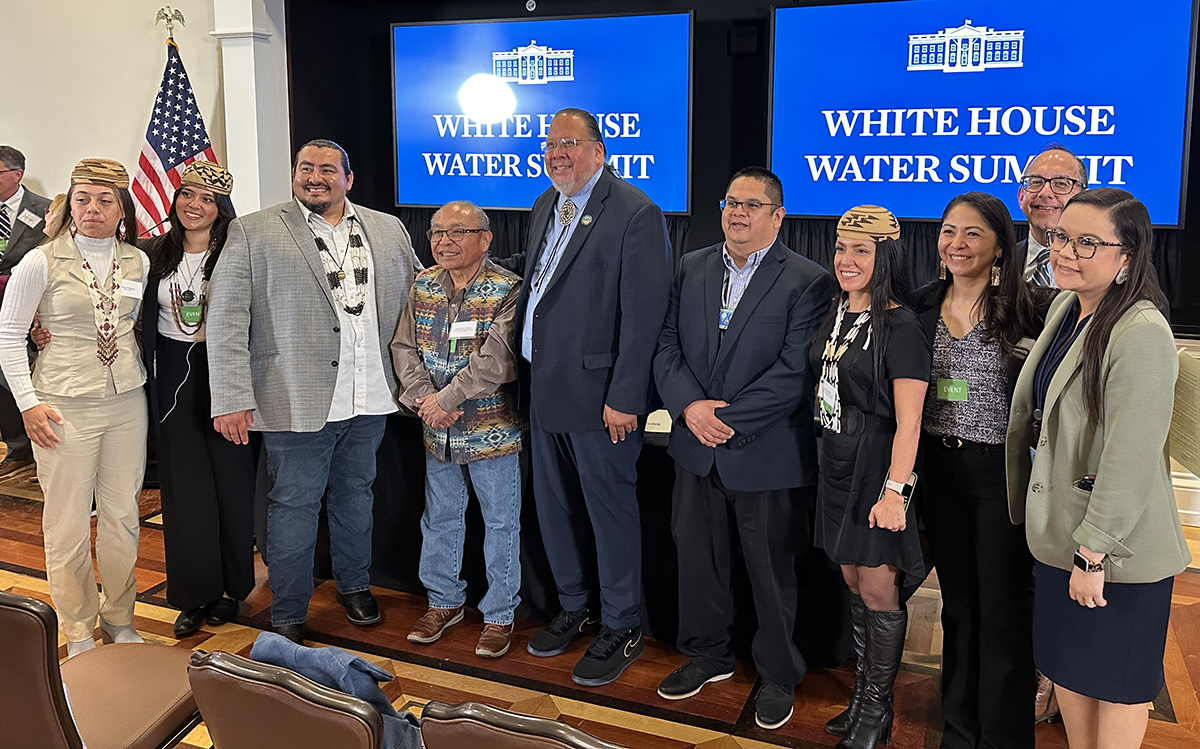 “Our vision is of a life-sustaining earth.” — Ted Strong
“Our vision is of a life-sustaining earth.” — Ted Strong
The Columbia River Inter-Tribal Fish Commission mourns the loss of atway* Ted Strong, Yakama Nation elder, leader, and former executive director of CRITFC.
Strong was appointed by the Commission in 1990 and served in that capacity until 1999. Previously, he had served the Yakama Nation as CFO and, following his tenure at the Commission, he served as Chief Judge of the Yakama Tribal Court, Director of the Yakama Tribal Housing Authority and, most recently, as director of the Yakama Chief Hops Association.
A myriad of issues faced Strong upon his appointment to CRITFC. He set about addressing them through the strength of the Commission’s resources by instituting organizational development through the formation of departments composed of professional staff. He initiated strategic planning to allocate the Commission’s budget and quickly undertook an effort to increase the Commission’s congressional appropriations. He also directed staff to develop a comprehensive plan for upriver salmon restoration, Wy-Kan-Ush-Mi Wa-Kish-Wit, that was adopted by the Commission and presented to members of Congress in 1996. “Ted served during the first Endangered Species Act listings for Columbia River salmon,” said CRITFC Fish Management manager Mike Matylewich. “He was a strong advocate for treaty rights and a proponent of the allocation of the conservation burden in the restoration of the listed populations.”

Ted Strong (far left) at President Clinton’s Forest Summit, 1993.
Strong believed that it was the tribes who held the solution to addressing salmon decline and restoration. He was a strong advocate for the melding of Western science and Traditional Ecological Knowledge to benefit salmon. Laura Berg, who served as the public information manager during this time, said, “For those of us who worked at CRITFC, he deepened our understanding and appreciation of the spiritual, cultural and historical connection that salmon have for members of the four tribes, and really for all the indigenous peoples of the Columbia River Basin. As part of that, he embraced and encouraged the marriage of contemporary science and traditional ecological knowledge. Ted was convinced that the perpetuation of the salmon and the tribal culture that depended on them would best be advanced through science and technology. As a result, he successfully grew CRITFC’s capacity in these fields.”
Strong was decisive in his efforts to galvanize united positions for the four member tribes to implement. When one of the member tribes balked at using outplanting of juvenile salmon as a means for recovery and restoration, he brought the tribal attorney and tribal biologists together to hash out the issues and present a recommendation that, to the present day, has been a hallmark of tribal restoration and recovery efforts.
When the Pacific Northwest national forests were at the peak of controversy over their utilization following the designation of the spotted owl as an endangered species, Strong was asked by President Clinton to close a major hearing on forest issues. His response to the president’s question of where do we go from here was:
“There are an estimated 5 million American Indians, some watching here today and they may be tempted to quote an old Hollywood Indian named Tonto and say ‘what do you mean we, Kemosabe?’”
His answer was one of the reasons why atwai Ted was appointed by President Clinton to the President’s Council on Sustainable Development that was chaired by Vice-President Al Gore. In that capacity, Ted’s voice was heard and respected by others on the Council including the secretaries of Interior and Commerce, the leaders of national environmental organizations, and the captains of nationwide industries. In many ways, he became an ambassador from Indian Country to the Clinton Administration.
Ted’s complete remarks at President Clinton’s Forest Summit in 1993.
Atwai Ted Strong’s eloquence was unequaled and, along with his intelligence and spirituality, was a source of his leadership. His rich and powerful voice will be missed by all who knew him.
Milestones
- 1990
- Began an effort to instill a spiritual understanding and cultural importance of salmon to staff and others he met or spoke to.
- Reorganized the CRITFC structure for better internal administration and external interactions with various other organizations, agencies, and tribes.
- Development of the CRITFC law enforcement program for tribal fishers protection and assistance as well as enforcement of tribal regulations
- 1991
- Coordinated the implementation of the tribal in lieu and fishing access legislation which improved tribal fishers fishing access to the Columbia River
- 1992
- Developed an ongoing strategy planning process for more efficient use of CRITFC staff and resources
- Represented the tribes as a member of the President’s Council on Sustainable Development
- 1993
- Completed a salmon marketing study which, in part, lead to a successful over-the-bank sales program for the tribal fishers.
- Represented tribes at the President’s Northwest Forest Summit
- Oversaw completion of a tribal fish consumption survey to determine adequacy of water quality standards
- 1994
- State and federal fisheries agencies sued by the tribes in federal court to prevent the agencies from destroying 300 Imnaha River spring chinook.
- “A futuristic vision relies upon cultivated strengths and is about civilization. An historic vision relies upon hereditary strengths and is about culture. Truly, a vision is not something to grasp in one’s hand but rather to hold in one’s heart.” — Ted at the Coastal America Conference, Washington DC, October 1994.
- 1995
- Development and adoption of the tribes’ salmon restoration plan Wy-Kan-Ush-Mi Wa-Kish-Wit, Spirit of the Salmon.
- “All of creation was provided to tribal people at no cost except to treat it respectfully. Nature revealed powerful secrets of life to us that we then used as our societal organizing principles. We cannot trade these honored principles for frivolous politics.” — Ted at the Mni-Sose Intertribal Water Rights Coalition meeting in Kansas City, MO, January, 1995.
- 1997
- Served as the alternate Commissioner on the Pacific Salmon Commission.
- “The sacred songs we sign mystically fill our memories with the inherent knowledge of our origin and purpose. Our ceremonials comprise the sum of our response to a Divine Maker for an abundant and dignified life.” — Ted, at a Ferrum College conference on Sustainability and Spiritualism in Roanoke, Virginia, October 1997.
- 1998
- State and federal fisheries agencies are sued by the tribes in federal court to prevent the agencies from destroying 800 Imnaha River steelhead.
- “Tribal people regard nature as life’s source; many non-tribal people relegate nature to a resource.” — Ted at an EPA Pollution Prevention Roundtable in Seattle, June 1998.
- 1999
- Columbia River Fish Management Plan is extended for six months to allow tribes and agencies to negotiate another fisheries plan.
“You are the dream of your ancestors… They made great offerings to the holy people to make that dream come true. Live your life honoring the customs, traditions, and practices of your people.” — Ted Strong
Special thanks to John Platt, Laura Berg, and Mike Matylewich for their assistance and contributions to this memoriam drawn from their many years of service working with atway Ted Strong.
*In Plateau culture, after someone passes they are referred to as “Atway.” Atway can be translated as “beloved.”



